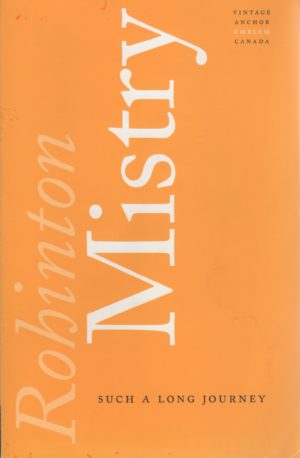
Such a Long Journey by Rohinton Mistry (2012. Vintage Anchor (Canada). ISBN978-0-7710-5704-5)
I was in Thunder Bay, Ontario this summer for a Finnish festival. I was riding around with my host, Ron Harpel, and stopped in at Chapter’s, the Canadian equivalent of Barnes and Noble, looking for a book to read. My intention was to buy Circus at the Edge of the Earth by my friend and internationally known Thunder Bay author, Charlie Wilkins. But alas, the largest bookstore chain in Canada did not have a single Wilkins title in stock, much less his first memoir. I settled for Such a Long Journey even though I’d not heard of the book’s author, Rohinton Mistry, because of the back jacket blurbs. I wasn’t disappointed.
The novel is well written in a style that reminds me, due to its reliance on mysticism and ritual, of Native American fiction (think Erdrich or Alexie or Grover). Mistry sometimes wanders a bit off the beaten path, tossing in asides and “howevers” that distract from the overarching plot but, in the end, the clarity of the author’s storytelling brings the plot back into view. Throughout the effort, Mistry carefully and adeptly gives us snippets of Indian culture, history, and Zoroastrian practices (the main character, Gustaf Noble, is of that religious minority; learn more at: https://en.wikipedia.org/wiki/Zoroastrianism) so that, as we are entertained by the fictional story, we learn a bit about one of the largest nations on earth and one of it’s least examined religions. Here’s a snippet that portrays living in a mosquito infested slum and the protagonist’s constant battle to keep his family safe from pestilence and vermin:
“Perfect, said Gustav, clearing the dining-table. He placed the round shallow dish under the bulb and filled it with water. When the surface grew still, the light bulb’s reflection steadied and shone brightly, tantalizingly, under water. Then the mosquitoes started to dive in. One by one, abandoning the real bulb, they plunged unswervingly suicidal in their attempts to reach the aqueous, insubstantial light. Somehow it was a greater attraction than the one hanging from the ceiling.”
My only criticism of this novel is that, as concise and crisp as the writing is, I was ready for more revelatory prose surrounding Prime Minister Gandhi (Indira) and the alleged corruption in her administration which is an almost unspoken accusation behind much of the action and plot involving Gustav and other characters, major and minor, in the book. Then too, the friction between Noble and his eldest child, Sohrab, while eventually resolved, could have used a bit more time on the stage. But over all, this is a good, good read. Not, as proclaimed, on the jacket, a great novel but one that surely whets the appetite to read more Mistrys (pun intended!).
4 stars out of 5.
Peace.
Mark


